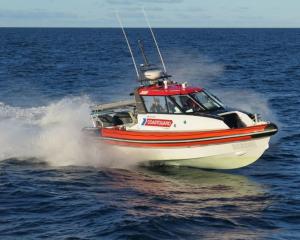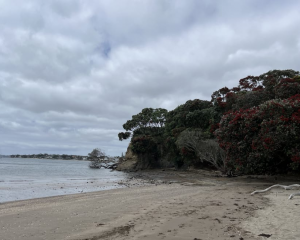Whatever you think of Winston Raymond Peters’ politics, there is little denying he is the most remarkable politician in our House of Representatives.
At five weeks past his 80th birthday Mr Peters maintains a schedule which would daunt the young and healthy.
Just back from an overseas trip as minister of foreign affairs and due to head overseas again next week, Mr Peters on Monday last week plunged into a hectic week at Parliament before flying to Dunedin on Friday morning. After his interview with the Otago Daily Times he was to deliver keynote speeches to the Otago Regional Investment Summit and at the formal opening of KiwiRail’s Hillside workshops - each packed full of his trademark pugnacity and humour - as well as attend a range of meetings.
The Hillside opening was a signal reminder of the central role played by a New Zealand First party which Mr Peters has always avowedly called centrist - even if at the time of writing it seems unlikely to work again with Labour.

Five years later, this time as part of a coalition with National and Act New Zealand Mr Peters - once again the deputy prime minister - was back to officially open the new Hillside, and take his share of the credit.
"It’s still the same party and it’s all the same cause. New Zealand First was the driving generator here," Mr Peters said.
"I’ll go there today, and there’ll be a stack of other politicians there. The question is, ‘what did you do about it?’ Only one party said rebuild our workshops. We did. Only one party has put the level of money into KiwiRail as we did.
"I’m back a second time in charge of KiwiRail ... it’s a nationwide, alternative, transport system. That is simply a no-brainer."
And, he was quick to remind people, that transport service includes the inter-island ferry ... another task the unflagging Mr Peters has taken on.
A quick run-down of the first 18 months of the coalition government suggests New Zealand First has already secured about 60%-70% of the commitments it secured as part of its agreements with its partner parties, albeit that some of them are "engagements", "investigations", "ensurings" or "progressings" which may, or may not, result in any tangible outcome.
Also, things such as reform of Pharmac, passing new resource management legislation and scrapping the Māori Health Authority were priorities shared by all three governing parties.
Nonetheless, NZ First had plenty of victories to claim, such as the Regional Infrastructure Fund, advancement of grocery sector reform and keeping the age of national superannuation at 65. Others, such as the pledged 500 extra frontline police in two years, are still promised but are taking longer than hoped to be achieved.
NZ First can also be more than satisfied that most public polls for the past 12 months have shown it well above the critical 5% MMP threshold, historically a level of support minor parties in coalition have found it difficult to achieve, let alone maintain.
"It [NZ First’s achievements] would be higher than that, be much higher than that," Mr Peters said.
"I would put it at 75, 80%, and I’m glad you’ve raised it because we have had just recently in the last week reviewed all of our intentions to ensure that nothing falls by the wayside of this timetable.
"Some of our supporters want you to do it all in the first five minutes, but in the three years, we’re going to do, to the max, what we promised to do, and to be able to demonstrate this, nobody keeps their promises as much as New Zealand First does."
One promise Mr Peters is adamant NZ First has kept is that the new Dunedin hospital will not be, to repeat his oft-used phrase, "nickel and dimed".
The ODT understands Mr Peters was an influential voice in the government’s ultimate decision to go ahead with building on the former Cadbury’s site, despite the cost blow-outs on the project, and he confirmed he had met a delegation from Otago and Southland to discuss the project.
"I did the best I could to make my party’s representation on why this hospital [would go ahead], downsized in cost as it had to be, because I know what the costings look like," Mr Peters said.
"Dunedin is going to get a hospital. In time, it’ll be a much better hospital too, because it’s got room for improvement."
In some ways the hospital is a perfect illustration of what Mr Peters says is NZ First’s role in government, of being both a handbrake and an accelerator.
The handbrake is reining in costs (which Mr Peters said had escalated "out of all proportion" to the rate of inflation) and the accelerator is getting the hospital built . . . just as Hillside was built.
Mr Peter is about to step aside as deputy prime minister, in keeping with the coalition agreement, but promises his party will be just as active after it shifts across the House to where Act New Zealand now sits,
"We will be making sure that our policy commitments are kept, doing our best to be a positive influence on the policies the government should be following and not experimenting on, and consolidating the lively support New Zealand First has got because of our focus on fundamental political principles," Mr Peters said.
"The common, ordinary, common-sense, plain-sense things is what distinguishes us from other parties. And that’s what we’re going to focus on, campaign real hard, starting real soon."
Winston Peters, Foreign Minister
On peace prospects in Ukraine
"People won’t agree with me on this, but it largely depends upon what Donald Trump does.
It’s in the fourth year of the war now; it was an absolutely illegal invasion.
They’ll make a lot of excuses, Russia will, but they’re all blandishments and propaganda ... [President Vladimir] Putin and others are caught by their duplicity of their actions."
On the power of small states
"My message has always been that small states matter, that small states deserve the same respect as the big states.
It’s the very foundation of our unity going forward.
Might is not right. The rules of war should apply. Democracy is important.
There are many things in which New Zealand has a tremendous record, and we should be proud of that and exhibit that, and seek to proselytise the advantage to other small countries of what we’re doing."
On Gaza
"It [Israeli aggression] is beyond the pale now, that here we’ve got the situations where the obstruction of aid is too apparent.
We’ve talked to the Palestinian Authority, we talked to the highest authorities in Egypt, in the Emirates, in Indonesia. We talked to a whole lot of countries, Turkey, which are largely or wholly Islamic, about this issue.
They understand New Zealand’s position, but apparently back here, the New Zealand protesters do not."
On surviving as foreign minister
"I have a seriously good, really focused diet. Then there are certain things that we do on the plane, drinking an extraordinary amount of apple juice - it’s one of the best liquids to have - and I have a herbal sleeping tablet that’s safe.
I try and stick to my domestic timetable back home, no matter what, because when you get back home, you’ll be back on sync, but much faster.
It is an arduous, difficult job, but you don’t realise how great it is to get 11 hours of peace with no phone going."












